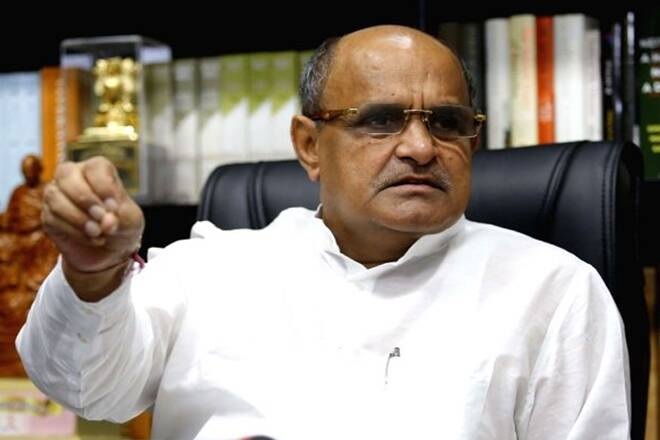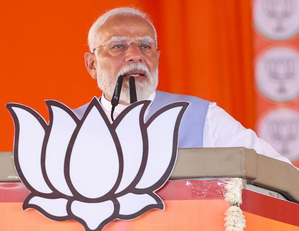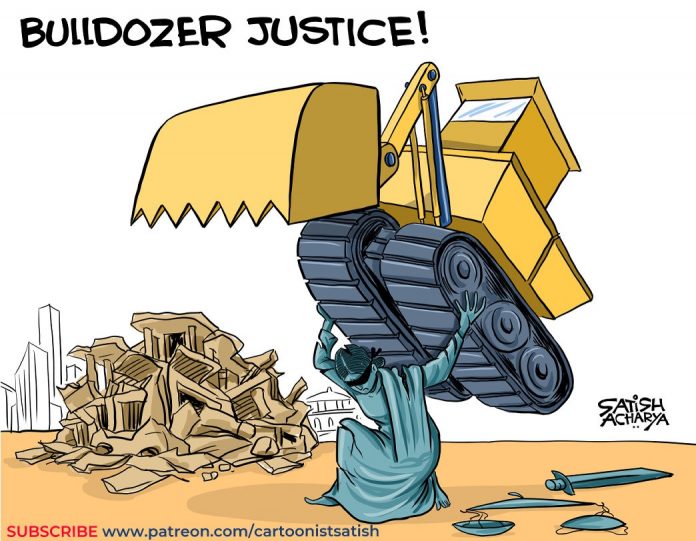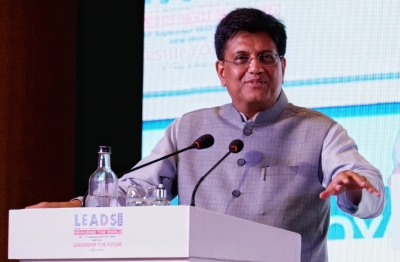
by Editor | Aug 26, 2024 | News, Politics
NEW DELHI — Amid escalating Israeli attacks on Gaza and with the conflict now extending to Lebanon and Iran, Indian opposition leaders have urged the Modi government to immediately halt the ongoing supply of ammunition to Israel. The demand came after a meeting between several opposition party leaders and Palestinian leader and General Secretary of Al-Quds, Muhammad Makram Balawi, here on Sunday.
A joint statement issued later stressed that India should not be complicit in the ongoing massacres in Palestine. The statement called for an end to the supply of arms to Israel, highlighting that the actions of the Israeli military in Gaza represent a severe violation of international law and principles of justice and peace.
KC Tyagi, a senior Janata Dal (United) leader voiced his support for the opposition stance. The party is an important ally of the ruling National Democratic Alliance government. “The Indian government, former prime minister Atal Bihari Vajpayee also supported Palestine. We want the oppression of the elderly, children, women, and innocents in Gaza to stop,” Tyagi said, reinforcing his long-standing support for Palestine.
The meeting, attended by MPs and leaders from Congress, Samajwadi Party, Aam Aadmi Party (AAP), and other opposition groups, underscored a growing rift between the central government’s current position and the views of some of its allies. Notable attendees included Rajya Sabha member of Samajwadi Party Javed Ali Khan, Congress leader and former Member of Parliament Kunwar Danish Ali, AAP leader Sanjay Singh, and Congress spokesperson Meem Afzal, among others.
Priyanka Gandhi, Congress General Secretary, has previously condemned Israel’s actions, aligning her stance with the broader opposition demand for justice and human rights in the region. The joint statement by the opposition leaders concluded by asserting that as a nation committed to justice and human rights, India must act swiftly to distance itself from the violence in Gaza.

by Editor | Aug 26, 2024 | News, Politics
Last week on Wednesday 21 August, 2024, PM Modi embarked on a significantly historic two-nation visit to Poland and Ukraine. The Prime Minister first landed in Poland, on August 21 and then he headed to Kyiv.
This was PM Modi’s first visit to the war-torn Ukraine since Moscow’s invasion of Kyiv, and was also the fist visit by an Indian PM to Ukraine since bilateral diplomatic relations were established 30 years ago.
During his day long visit to Ukraine, on Friday 23 August, 2024, PM Modi met with Ukrainian President Volodymir Zelenskyy in the background of the ongoing Russia-Ukraine War. During the talks PM Modi personally offered New Delhi’s assistance at the highest level to help resolve the conflict.
“We say it very loudly and clearly that we support the respect for sovereignty and territorial integrity, it’s our highest priority.” Modi said. He further said that India is ever ready to play an ‘active role’ in every effort to restore peace in Ukraine and he would even like to contribute personally to end the conflict.
At their first face-to-face meeting, PM Modi met Ukrainian President Volodymyr Zelenskyy with a warm hug that came barely six weeks after Modi had similarly hugged the leader of Ukraine’s arch-enemy, President Putin, and which was criticised by the US officials.
This show of personal bonding poses some rather bigger questions, i.e. firstly, whether India is treating both Russia and Ukraine equally and secondly, whether it has the diplomatic heft to get the on-going war stopped at the earliest?
As to the first question, PM Modi himself offered a rather eloquent and succinct response by asserting that “We are not neutral. From the very beginning, we have taken sides. And we have chosen the side of peace. We have come from the land of Buddha where there is no place for war. We have come from the land of Mahatma Gandhi who had given a message of peace to the entire world.”
During the last two-and-a-half years India has chosen to distance itself from the US-led Western bloc’s position of imposing sanctions on Russia, but it also expressed “heartbreaking” concern at the killing of innocent children. During his Moscow visit, Modi had conveyed to the Russian President Putin that “this is not the era of war”. This signalled that New Delhi doesn’t turn a blind eye to Russian actions and that didn’t go unnoticed by the Western bloc.
Further, the Indian position of abstaining from the UN resolutions over the past two-and-half years, and making it clear that “dialogue and diplomacy” is the way forward projects Delhi as a player working towards peace.
And finally, the important element of India asking Putin and Zelenskyy to sit together – means that Delhi is ready to nudge both to have a direct conversation, instead of peace summits which are unrepresented by one side – at the Burgenstock, Switzerland summit in June earlier Russia was not invited.
India has been part of several multilateral summits, starting from Copenhagen, Jeddah, Riyadh, Davos and Burgenstock, which have talked about the process to resolve the conflict, but there has not been any headway so far.
At present it seems that the Western bloc which is preoccupied with its own set of problems and the presidential elections in the US, is least bothered about the Russia-Ukraine conflict. This leaves India and China to play a proactive role of a negotiator between the warring nations.
On its part New Delhi believes it has more leverage with the Western bloc, than Beijing. Though the war could be resolved only when the US, Europe and Russia come together, but getting a conversation started between Ukraine and Russia could be a good start form India’s point of view. PM Modi’s visit is part of India’s effort to bring the two warring sides to the table directly, and Delhi can be the facilitator.
However, in the current scenario when New Delhi is buying Russian oil in huge quantity, Zelenskyy taking Modi’s word at face value seems rather bleak. New Delhi has overtaken Beijing as the biggest importer of Russian oil. They have grown from 0.5 per cent of India’s total oil imports to 44 per cent this month.
During the talks on Friday, the Ukrainians raised the issue and said that if India changed its policy here, the war would end. In his interaction with the Indian media, President Zelenskyy said that because of the sanctions, Russian trade elsewhere faced restrictions, and, “If you stop the import of oil, Putin will have huge challenges”. He bluntly noted that Putin’s war economy was benefiting from the billions he was earning through oil exports to India and China.
Later in response, the External Affairs Minister S Jaishankar pointed out at a media briefing that Indian imports needed to be looked at in the context of embargoes on buying Iranian and Venezuelan oil and as of now they helped the international economy in ensuring that “prices remain reasonable and stable.”
All in all, the way the war is going, pressure for peace negotiations is likely to grow and both Ukraine and Russia will position themselves for it. As of now, there are no indications that the Russians are willing to talk peace. Despite the Kursk offensive, Kyiv is finding the going tough and as of now, Russia continues to occupy large territories in eastern and southern Ukraine.
Zelenskyy wants a second peace summit in November and says he will have a peace plan ready for it and has asked Russia to attend as well. It remains to be seen how New Delhi will handle this proposal for a second peace summit.
Meanwhile, White House has said that the United States welcomes any other country willing to be helpful in trying to end the conflict in Ukraine and Prime Minister Narendra Modi’s visit to Kyiv can contribute to achieving a peaceful resolution aligned with Zelenskyy’s vision.
For India, however the biggest challenge is to get the prime minister’s personal initiative leading to a resolution accepted by both the parties, which may help make India emerge as the leading and active voice of the Global South too.

by Editor | Aug 26, 2024 | News, Politics
The systematic demolition of Muslim homes in India is not just a matter of urban planning or law enforcement; it is a form of state-sanctioned violence that is eroding the very fabric of justice in the country. The alarming trend of targeting Muslim properties under the pretext of law enforcement has raised serious questions about the role of the judiciary, particularly the Supreme Court of India, which is the guardian of the Constitution.
The trend became more evident in September 2017, when Uttar Pradesh Chief Minister Yogi Adityanath declared that his government would bulldoze the properties of those involved in crimes against women and weaker sections of society. “My government will bulldoze houses of anyone even thinking of perpetuating crime against women and weaker sections of the society,” he warned. This statement was an ominous indication that the BJP government in Uttar Pradesh was prepared to bypass legal processes and resort to extrajudicial measures to deliver what it perceived as justice. However, this “bulldozer justice” has disproportionately targeted the Muslim community.
The silence of the Supreme Court in the face of such blatant violations of constitutional rights is deeply troubling. The court, which is supposed to act as a check on the executive and protect the rights of all citizens, has remained largely indifferent as bulldozers have demolished Muslim homes across the country. This is not merely a case of judicial inaction but appears to be a deliberate decision to ignore the dehumanization of Muslims, thereby normalizing fascism and undermining the very principles of justice and equality.
Did the Supreme Court not hear the audio of the Bhind Collector stating that if a Muslim commits a crime, their house will be demolished, unlike those of people from other religions
One of the most egregious examples of this “bulldozer justice“ occurred in Allahabad, where the house belonging to Afreen Fatima’s mother was demolished. Afreen, a student leader, had been a vocal critic of the Modi government during the protests against the Citizenship Amendment Act (CAA). Just two days before the demolition, police detained her 57-year-old father, Mohammad Javed, along with her mother, Parveen Fatima, and teenage sister, Somaiya, for participating in a protest. Despite the police’s justification that all due processes were followed, the selective targeting of Afreen’s house raises serious questions. If the house was indeed an “illegal structure,” why was it allowed to be built in the first place? And if it was built without proper approvals, will the authorities now demolish all such structures, or is this a punishment reserved solely for Muslims?
Similarly, on 17 August 2024, in Rajasthan’s Udaipur, the house of Rashid Khan was demolished a day after a 15-year-old boy, who was a tenant in the house, allegedly stabbed his classmate at school. The demolition, ordered by the Udaipur district administration and the Rajasthan Forest Department, was a stark reminder of the arbitrary nature of “bulldozer justice.” How can a person be punished for the alleged crime of a tenant’s son? And was there any legal process followed before the demolition? The Supreme Court, which should have been the first to question the legality of such actions, remained silent.
The demolition spree continued with the razing of the lavish bungalow of Haji Shahzad Ali, a former president and ex-Congress district vice president. Shahzad had gone to the police station to submit a memorandum demanding action against a Hindu “saint” who had made blasphemous comments. The situation escalated into a confrontation, resulting in the demolition of Shahzad’s house and the destruction of his cars by bulldozers.
Once again, the Supreme Court remained a mute spectator. If the construction of Shahzad’s house was illegal, why was it allowed to stand until this incident? Were the cars declared illegal before being destroyed? And why were the alleged culprits paraded and punished without trial?
The selective application of bulldozer justice has made it clear that this is not about upholding the law but about targeting a specific community. The judiciary’s silence in these cases is particularly disturbing when contrasted with its response to other incidents. For example, after the Jat reservation agitation in 2016, which resulted in 30 deaths and damages worth Rs. 34,000 crore, not a single house was demolished. This stark difference in treatment raises the question of whether the judiciary is truly committed to justice or is influenced by political pressures.
The judiciary’s role as the guardian of the Constitution is being called into question. Is the Supreme Court acting on its conscience, or is it succumbing to greed, personal gain, political influence or to please the majority ? The popularity of terms like “Bulldozer Raj,” “Bulldozer State,” “Bulldozer Justice,” “Bulldozer Baba,” and “Bulldozer Mama” among the Hindu majority is a reflection of how deeply entrenched this form of justice has become.
According to a report published in Frontline, over 150,000 homes have been razed, and 738,000 people have been left homeless in just two years, with Muslims and marginalized groups bearing the brunt of this destruction.
The Supreme Court must realize that if fascism prevails, the courts will become irrelevant, and lawyers will become jobless. In a fascist regime, decisions are made by political masters, not by the rule of law. The dehumanization of Indian Muslims through the demolition of their houses is not just an attack on a specific community; it is an attack on the very foundations of justice and democracy in India. The Supreme Court, as the custodian of the Constitution, has a duty to protect all citizens, regardless of their religion. Its silence in the face of such grave injustices is a betrayal of that duty.

by Editor | Aug 26, 2024 | News, Politics
New Delhi: Congress leader Rahul Gandhi on Sunday asked Prime Minister Narendra Modi to fulfil the nation’s demand for a caste census immediately otherwise he would see the next PM do it.
No power can stop a nationwide caste census, the leader of opposition in the Lok Sabha said on X in Hindi, tagging a post by the Congress on a “mood of the nation poll” by a media group which said 74 per cent people in August said a caste census must be conducted, up from the 59 per cent in February this year.
“Modi ji, if you are thinking of stopping the caste census, you are dreaming – no power can stop it now! India’s order has arrived – soon 90 per cent Indians will support and demand caste census,” Gandhi said on X.
“Implement the order now, or you will see the next Prime Minister do this,” the Congress leader said.
His remarks came a day after he pressed the demand for a nationwide “caste census” and said 90 per cent people of the country are sitting out of the system and the step should be taken in their interest.
He had also said for the Congress, the “caste census” is the foundation and a tool for policy making.

by Editor | Aug 26, 2024 | News, Politics
New Delhi: Union Commerce Minister Piyush Goyal on Sunday said that he had “a very fruitful day” in Singapore where he interacted with leaders of major global investment firms having over $500 billion of assets under management (AUM).
The Union Minister discussed bilateral trade and investment issues with the global business leaders in Singapore like Temasek holdings, DBS bank, OMERS, Keppal infrastructure and TVS Motor Company, among others.
“Positioned India as an attractive investment destination and invited these multinationals to be a part of our development journey,” he posted on X.
In the meetings, key discussions were held to explore and enhance investment opportunities between India and Singapore, focusing on mutual growth and collaboration across diverse sectors.
“The focus was on exploring investment opportunities in India, leveraging the country’s economic growth, and fostering collaboration across various sectors,” according to the Ministry of Commerce and Industry.
The discussions focused on scaling up investments, particularly in the SME sector, enhancing India’s investment climate, supporting sustainable development through decarbonisation, and identifying synergies for family-owned businesses in a changing global landscape, the ministry informed.
Piyush Goyal also visited the Institute of Technical Education (ITE) Headquarters and ITE College Central in Singapore to explore opportunities for collaboration between the two nations in developing cutting-edge learning environments.
He also toured the Aerospace and Smart Manufacturing Hubs and gained deeper insights into the philosophy of continuing education and skill development.





